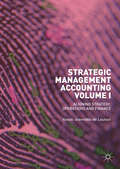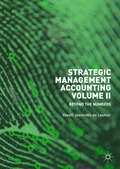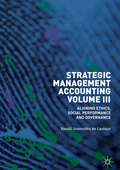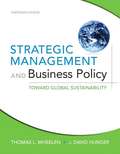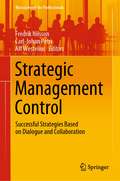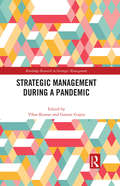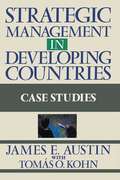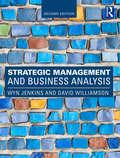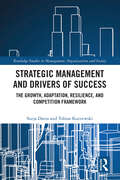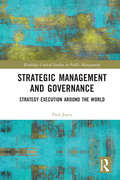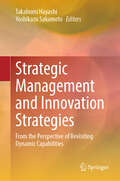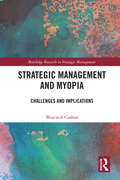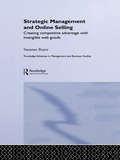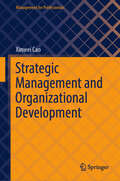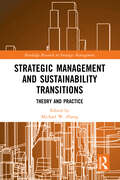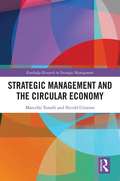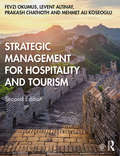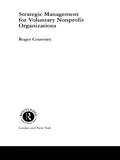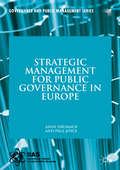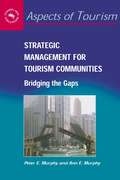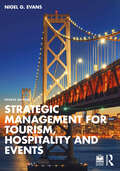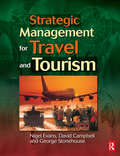- Table View
- List View
Strategic Management Accounting, Volume I: Aligning Strategy, Operations and Finance
by Vassili Joannidès de LautourThis book responds to key issues in strategic management control by studying the interplay between strategy, operations, finance and controls. Grounded in research but written with practitioners and students in mind, it addresses the most up-to-date management control issues in the public sector, forecasting, budgeting and controls in international organisations.
Strategic Management Accounting, Volume II: Beyond the Numbers
by Vassili Joannidès de LautourThis book responds to key issues in strategic management control beyond the numbers. Grounded in research but written with practitioners and students in mind, this second volume addresses the most up-to-date management control issues in the public sector, forecasting, budgeting and controls in international organisations.
Strategic Management Accounting, Volume III: Aligning Ethics, Social Performance and Governance
by Vassili Joannidès de LautourThis book responds to key issues in strategic management control by studying the interplay between ethics, social and environmental performance and governance. Grounded in research but written with practitioners and students in mind, it addresses the most up-to-date issues pertaining to ethical insights into management accounting and accountability.
Strategic Management And Business Policy: Toward Global Sustainability, 13th Edition
by Thomas L. Wheelen J. David HungerThis text equips readers with the strategic concepts they will need to know as we face issues such as climate change, global warming and energy availability. This thirteenth edition provides an array of timely, well-researched, and class-tested cases--nineteen of which are new or revised.
Strategic Management Control: Successful Strategies Based on Dialogue and Collaboration (Management for Professionals)
by Fredrik Nilsson Carl-Johan Petri Alf WesteliusStrategic management control differs from traditional management control in several important respects. First, it supports both strategy formulation and strategy implementation. Second, it is to a large extent based on non-financial information. Third, it deals with both the long and short term and supports not only tactical, but also strategic and operational decision-making. Fourth, and perhaps most importantly, strategic management control is designed for, and adapted to, each organisation’s unique strategies.In this context, the book emphasises the importance of dialogues. The authors argue that it is unwise to assume that decisions taken at the top of the organisation will automatically be executed and obeyed throughout the organisation. Instead, they highlight the importance of dialogue and collaboration, both between hierarchical levels within the organisation and between actors in the network. Such communication is essential to making management control processes both strategic and successful.The book follows a clear structure, from the design of strategies to the everyday evaluation and discussion of performance and results. Though primarily intended for professionals working in strategy and management control at organisations, it will also benefit students and academics interested in strategy and management control.
Strategic Management During a Pandemic (Routledge Research in Strategic Management)
by Vikas KumarThe COVID-19 pandemic changed world dynamics, working scenarios, as well as professional and emotional dimensions. The virus has emerged as a significant threat for the continuity of business. Keeping the gravity of the problem in mind, companies must understand the need for change and must now update their strategy to account for pandemics. The next pandemic may be more severe than the current one, meaning that organizations need to devise mechanisms and business models to fight with these situations and maintain business continuity. They should not only look forward to saving plants, machinery and infrastructure, but also concentrate on employee welfare, customer engagement and satisfaction during this crisis time. The book will not only present the evidence of various effective solutions to run a business in the time of a pandemic, but also put forward the new models and practices of business being followed by people at the time of crisis. It aims to create a bridge between existing business models and proposed business solutions, focusing on existing theories and most importantly case studies from recent happenings. This rich collection of chapters will provide insights regarding the business challenges, opportunities and practices during pandemic situations like COVID-19, making it particularly valuable to researchers, academics and students in the fields of strategic management, leadership and disaster management.
Strategic Management In Developing Countries
by James E. AustinDesigned for business school courses and in-house company training programs, this companion to Managing in Developing Countries presents 35 case studies organized around Professor Austin's Environmental Analysis Framework, a powerful, field-tested tool designed to help managers examine, prepare for and compete in the Third World business environment. Through comprehensive and thoroughly tested classroom-tested cases, Austin systematically examines the economic, political, and cultural factors of each country at international, national, industry, and company levels. The cases also reveal the critical strategic issues and operating problems that managers will encounter in developing countries--in governmental relations, finance, marketing, production, and organization.
Strategic Management and Business Analysis
by Wyn Jenkins Dave WilliamsonHow can managers analyze their current and future business strategies? This textbook introduces the fields of business analysis and strategic management to provide students with an understanding of the key questions that need to be asked to understand an organization's options. The second part of the book provides tools and techniques to help organize and improve corporate strategy. Uniquely, the authors provide resources to assess aspects of strategic goals which are sometimes overlooked such as financial performance, ethical and environmental considerations and business models. They cover a diverse range of companies from Supermarkets like Aldi and Tesco to Caermory Whiskey and Chinese manufacturing. This textbook is perfect reading for students who want to apply strategic thinking to organizations and benefits from the inclusion of new case studies throughout the text as well as 10 extended cases in a separate section.
Strategic Management and Drivers of Success: The Growth, Adaptation, Resilience, and Competition Framework (Routledge Studies in Management, Organizations and Society)
by Surja Datta Tobias KutzewskiStrategy is essentially about achieving organisational success. Growth, Adaptation, Resilience, and Competition (GARC) is a general framework that helps organisations think creatively about attaining success and acknowledges the reality that there is no one single criteria for success. What drives and defines organisational success? Using the path- breaking GARC framework, this book provides an answer to this important question. Combining practice with theory, the reversal of the conventional ‘theory with practice’ idea being intentional, one of the standout features of this book is that it articulates business heuristics for each of the drivers of success along with guidelines on how to use them. To illustrate the empirical grounding of the theoretical aims, the authors connect multiple real- life business cases to each of the four GARC dimensions. This book will therefore be of value to researchers, academics, practitioners, and advanced students in the fields of strategy, organisational studies, and management.
Strategic Management and Governance: Strategy Execution Around the World (Routledge Critical Studies in Public Management)
by Paul JoyceThis book is an investigation into the evolving nature and consequences of strategic management in public governance. It is prompted by the practical as well as the academic interest in the application of strategic management to public governance and to the public sector. The main features of this book are its management focus, its use of published statistics and expert ratings to develop empirical insights into the capabilities and processes of strategic management in government, and its concern for practical relevance. Although this book deals with governments, it is a management book and not a political book. It is, in fact, a management book that "frames" strategic management in government as a tool of (or enabler of) the public governance process. This is relatively novel. The book’s management focus has several themes, which can be summed up as comprising: the use by government of long-term strategic visions and strategies, effective management of the delivery of strategic visions and strategies, the performance of national governments, and the implications of strategic state capabilities for the quality of public services, for sustainability, and for managing strategic crises. This book will be relevant reading to researchers, scholars, advanced students, policy makers and public administrators in the fields of strategy, strategic management, and public governance.
Strategic Management and Innovation Strategies: From the Perspective of Revisiting Dynamic Capabilities
by Takabumi Hayashi Yoshikazu SakamotoThis book uses case studies to analyze how companies have implemented business strategies to adapt from analogue to digital, from hardware-based to software-based, and from incremental to radical innovation, in the new-generation competition. Through this analysis, the distinctive features and challenges of these companies are examined from the perspective of innovation strategy, focusing on dynamic capabilities of the companies. A major objective of this monograph is to identify the key determinants that make up the dynamic capabilities of the companies in international competitive marketplaces. In other words, the analytical focus is on clarifying the consistency and differences between the representative dynamic capability theory and the innovation strategies of companies examined in this study. It also presents management strategies from the perspective of &“organizational transformation&” when confronting companies with cost-competitive and innovative resources. The common feature of the studied companies is that entrepreneurial managers and leaders have played the critical roles in creating new business units with organizational transformation. The book demonstrates the differences in innovation strategies from those of typical companies previously analyzed. This book is highly recommended not only to academicians but to businesspeople who seek an in-depth and up-to-date overview of unique innovation strategies of companies that are leaders in global markets.
Strategic Management and Myopia: Challenges and Implications (Routledge Research in Strategic Management)
by Wojciech CzakonThis book investigates the phenomenon of strategic myopia, which refers to important cognitive distortions that managers systematically display. It captures narrow views and preferences, which are likely to hurt firms’ long-term prospects. Instead of accusing managers of imperfections, opportunism or blindness, this book explains how strategic myopia stems from individual dispositions, how it is shaped by team contingencies, and encouraged by organisations’ design. The reader will learn how a metaphor introduced to explain business failure evolved over decades to become a concept useful in understanding intertemporal choices, technology substitution, competitive advantage erosion, competitive blind-spots and missed opportunities. In addition to explaining the mechanisms that encourage myopic behaviours, readers are offered a set of effective ways to address strategic myopia. A key benefit of this work is that the structure of the book allows the use of chapters separately. The core message is that eliminating strategic myopia is hardly possible, and may actually hurt the firms’ short-term efficiency. However, organisations may develop capabilities, and implement designs that favour balancing the short-term benefits of myopia and alleviate its long-term drawbacks. This book will be of interest to scholars, researchers, advanced students and experienced managers in the fields of strategic management and organisational behaviour.
Strategic Management and Online Selling: Creating Competitive Advantage with Intangible Web Goods (Routledge Advances in Management and Business Studies #Vol. 29)
by Susanne RoyerFocusing on Business to Customer (B2C) internet business, and on firms that offer intangible products and/or services that can be directly consumed via the world wide web, Strategic Management and Online Selling also covers immaterial products and online news information or home banking. Considering how firms with similar specific characteristics are able to realize competitive advantages, this topical book discusses an area of particular contemporary importance and increasing academic study.
Strategic Management and Organizational Development (Management for Professionals)
by Xinwei CaoThis book offers a systematic analysis of key business challenges, including risk mitigation through first principles thinking, the transformation of traditional manufacturing, the impact of genetic bias on strategy, and the relationship between urbanization and individual success. By recognizing patterns, leveraging proven models, and fostering adaptability, companies can better navigate disruptions and achieve sustainable growth. This book serves as a valuable resource for those looking to refine their strategic thinking and organizational development skills. What sets this book apart is its interdisciplinary approach, integrating evolutionary theory, economics, and management strategies to provide a deeper understanding of market competition and business adaptation. It offers a practical framework for navigating today&’s dynamic business landscape, making it an essential resource for professionals, entrepreneurs, and students alike. This book not only delivers key insights into surviving and thriving in hyper-competitive markets but also serves as a valuable guide for anyone looking to refine their strategic decision-making and organizational development skills.
Strategic Management and Public Service Performance
by Richard M. Walker George A. Boyne Rhys Andrews Jennifer LawStrategic management makes a difference to the performance of public organizations. This book demonstrates that the most appropriate response is 'it all depends': on which aspects of strategy content and processes are pursued together, and how these are combined with organizational structure and the technical and institutional environment
Strategic Management and Sustainability Transitions: Theory and Practice (Routledge Research in Strategic Management)
by Michael ZhangThe subject of sustainability transitions has, in the past decade or so, become an established research field for academics, policy makers and practitioners alike. Conceptual and theoretical developments in the filed have gradually advanced from the perspectives of socio-technical systems and business models. Scholars contend that it is the interactions of the networks of actors, technologies, and institutions that drive transition processes toward sustainability. In this volume we further advance this line of inquiry with a special reference to strategic management of sustainability transitions, in both theory and practice. In theoretical development, we have selected three chapters to encompass the themes of (1) the interactions between ecological systems and human systems; (2) a critique on the continuous expansion of large multinational companies and their strategic control of key resource inputs through the lenses of circular economy and natural resource-based view; and (3) a multi-stakeholder ecosystems framework for the management of sustainability transitions with structural alignment of focal value propositions. The United Nations’ Sustainable Development Goals (SDGs) are critically addressed and empirically examined. It will become an essential reader and a reference book for researchers and postgraduate students interested in strategic management, international business, innovation studies, consumer behavior, and public administration.
Strategic Management and the Circular Economy (Routledge Research in Strategic Management)
by Marcello Tonelli Nicolò CristoniIn recent years, the Circular Economy (CE) has gained worldwide attention as an effective alternative economic system to the current take-make-waste model of production and consumption. As more and more firms begin to recognize the potential of this novel approach, the CE quickly moves from theory to practice and the demand for a coherent and structured strategic approach – one that companies can rely upon when commencing their circular journey – grows accordingly. Strategic Management and the Circular Economy aims to bridge the theory-practice gap by putting forward a detailed step-by-step process for analysis, formulation, and planning of CE strategies. Starting from a solid framework of easy-to-grasp constructs (key principles, business objectives and areas of intervention), the authors guide the reader through an understanding of how conventional tools for strategic management can be re-programed under a CE perspective. To assist learning and encourage circular thinking, the reader is constantly prompted with examples of how forward-looking companies across industries and geographies are already applying circular strategies to future-proof their operations, boost innovation, penetrate new markets and secure customer loyalty.
Strategic Management for Hospitality and Tourism
by Prakash Chathoth Levent Altinay Fevzi Okumus Mehmet Ali KoseogluStrategic Management for Hospitality and Tourism is an essential text for both intermediate and advanced learners aspiring to build their knowledge related to the theories and perspectives on the topic. The book provides critical and analytical insights on contemporary theoretical models and management practices while enhancing the learning process through worked examples and cases applied to the hospitality and tourism setting. This new edition highlights the rapidly changing socio-economic and political global landscape and addresses the cultural and socio-economic complexities of hospitality and tourism organizations in the new era. It has been fully updated to include: A new chapter on finance, business ethics, corporate social responsibility, and leadership as well as new content on globalisation, experience economy, crisis management, consumer power, developing service quality, innovation and implementation of principles. New features to aid understanding of the application of theory, and spur critical thinking and decision making. New international case studies with reflective questions throughout the book from both SME’s and large-scale businesses. Updated online resources including PowerPoint presentations, additional case studies and exercises, and web links to aid both teaching and learning. Highly illustrated and in full colour design, this book is essential reading for all future hospitality and tourism managers.
Strategic Management for Nonprofit Organizations (Routledge Studies in the Management of Voluntary and Non-Profit Organizations)
by Roger CourtneyThe voluntary nonprofit sector is now involved in all aspects of people's lives. The management of such organizations has never been of more interest than it is now, and the sector as a whole is in a period of great change. Well-meaning amateurs are being replaced by highly committed and professional leaders, and one in every six employees in the service sector is now working in the voluntary sector. In this shifting climate, this enlightening book questions whether voluntary organizations should now be more business-like. Helpful features of the text include: * chapter introduction and summaries* boxed features (including examples of mission statements, value statements and the strategy planning pyramid)* detailed case-studies of nonprofit organizations (covering strategic issues, strategic planning processes and examples of the use of particular techniques)* review and discussion questions* extensive bibliography. Presenting a unique insight into the theory and practice of strategic management for voluntary nonprofit organizations, this book will be of great interest to both practitioners and students of voluntary sector management.
Strategic Management for Public Governance in Europe
by Paul Joyce Anne DrumauxThis book investigates the role and effectiveness of strategic management within public governance in Europe. Using findings from qualitative studies, it explores the governance processes at the level of the European Union as a supranational institution, and the level of national governments. It presents empirical research that reveals fresh insights into the extent to which the public, effective government, and desirable societies are interrelated in individual Member States. Further, it enables the authors to critically analyse and develop the concept of the 'Strategic State', and to introduce the idea of 'credible government' that lays out a pathway to effective governance. This book argues for the need to develop more effective multi-level governance that combines unity of strategic purpose at the European level with strategic leadership and mobilisation at the national level. It will appeal to practitioners in addition to scholars in the fields of public policy, public management and European Union studies.
Strategic Management for Tourism Communities
by Peter E. Murphy Ann E. MurphyStrategic planning within a community framework is essential for tourism to reach its potential. This book combines the four principal functions of business management and stakeholder analysis to develop a model of collaborative decision making. This model offers a template for communities to understand and make the most of their tourism resources.
Strategic Management for Tourism, Hospitality and Events
by Nigel EvansStrategic Management for Tourism, Hospitality and Events is the must-have text for students approaching this subject for the first time. It introduces students to fundamental strategic management principles in a Tourism, Hospitality and Events context and brings theory to life by integrating a host of industry-based case studies and examples throughout. Among the new features and topics included in this edition are: Extended coverage to Hospitality and Events to reflect the increasing need and importance of a combined sector approach to strategy New international Tourism, Hospitality and Events case studies from both SME's and large-scale businesses are integrated throughout to show applications of strategic management theory, such as objectives, products and markets and strategic implementation. Longer combined sector case studies are also included at the end of the book for seminar work. New content on emerging strategic issues affecting the tourism ,hospitality and events industries, such as innovation, employment, culture and sustainability Web Support for tutors and students providing explanation and guidelines for instructors on how to use the textbook and case studies, additional exercises, case studies and video links for students. This book is written in an accessible and engaging style and structured logically with useful features throughout to aid students' learning and understanding. This book is an essential resource to Tourism, Hospitality and Events students.
Strategic Management for Tourism, Hospitality and Events
by Nigel EvansStrategic Management for Tourism, Hospitality and Events is the must-have text for students approaching this subject for the first time. It introduces students to fundamental strategic management principles in a tourism, hospitality and events context and brings theory to life by integrating a host of industry-based case studies and examples throughout. Among the new features and topics included in this third edition are: New and fully updated international case studies from both SMEs and large-scale businesses integrated throughout to show the various applications of strategic management theory. More extensive combined sector case studies on relevant topics such as Airbnb are also included at the end of the book for seminar work. New content on relevant topics such as big data, artificial intelligence, political external environment, social media and e-marketing, sustainability and CSR, absorptive capacity, and innovation. Web support for tutors and students providing explanation and guidelines for instructors on how to use the textbook, as well as supplementary exercises, case studies and video links for students. This book is written in an accessible and engaging style and structured logically with useful features throughout to aid students’ learning and understanding. It is an essential resource for tourism, hospitality and events students.
Strategic Management for Tourism, Hospitality and Events
by Nigel G. EvansStrategic Management for Tourism, Hospitality and Events is the must-have text for students approaching this subject for the first time. It introduces students to fundamental strategic management principles in a tourism, hospitality and events context and brings theory to life by integrating a host of industry-based case studies and examples throughout. This fourth edition has been fully revised and updated to reflect the major changes in strategic direction for these industries due to the most significant global crisis ever, as well as significant technology advances and issues related to sustainability. New features and topics in this fourth edition include: New international tourism, hospitality and events case studies from both SMEs and large-scale businesses are integrated throughout to show applications of strategic management theory. New Technology Focus short cases are included, as well as longer combined sector case studies on topics such as COVID-19 impacts. A new chapter on sustainability and corporate social responsibility explores how the principles of sustainability can be incorporated into the strategy of tourism, hospitality and events organizations. Technology is integrated into all chapters, looking at big data, artificial intelligence, the external political environment, social media and e-marketing, absorptive capacity and innovation. Impacts and implications of COVID-19 are discussed, considering industry responses, financial implications and future emergent strategies. A contemporary view incorporates the broad range of academic literature and industry developments that have emerged in recent years and provides a particular focus on smaller organizations, recognizing their key role. Web support for tutors and students provides explanations and guidelines for instructors on how to use the textbook and case studies, additional exercises and video links for students. This book is written in an accessible and engaging style and structured logically, with useful features throughout to aid students’ learning and understanding. It is an essential resource for tourism, hospitality and events students.
Strategic Management for Travel and Tourism
by David Campbell George Stonehouse Nigel EvansStrategic Management for Travel and Tourism is the must-have text for students studying travel and tourism. It brings theory to life by using industry-based case studies, and in doing so, 'speaks the language' of the Travel and Tourism student.Among the new features and topics included in this edition are:* international case studies from large-scale businesses such as Airtours, MyTravel and South West Airlines * user-friendly applications of strategic management theory, such as objectives, products and markets and strategic implementation, together with illustrative case studies, and longer case studies for seminar work and summaries* contemporary strategic issues affecting travel and tourism organizations, such as vertical integration and strategic alliancesStrategic Management for Travel and Tourism is a well-rounded book, ideal for all undergraduate and postgraduate students focusing on strategy in travel and tourism.
